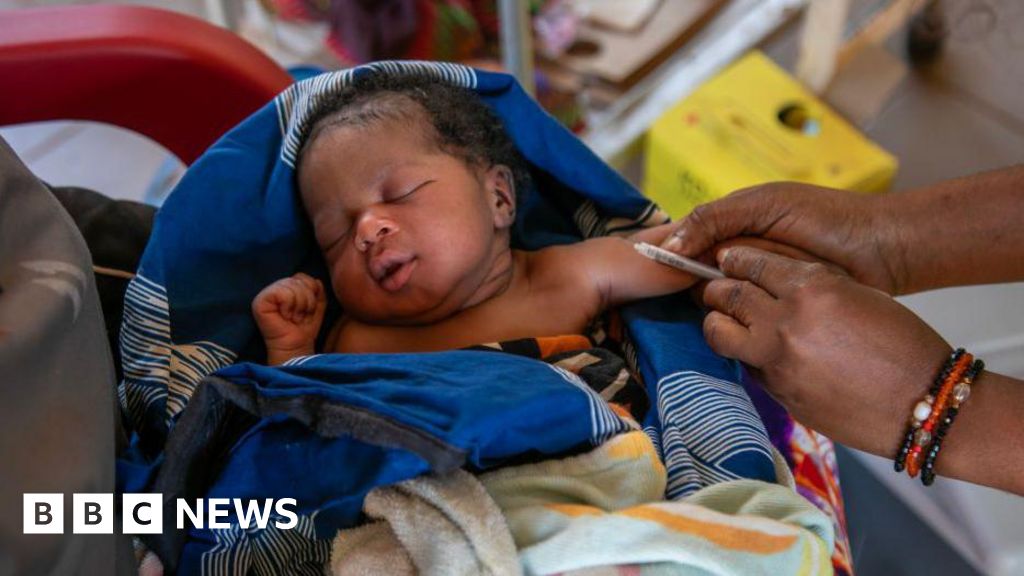Progress in vaccinating children against a variety of life-threatening diseases has stalled in the past two decades - and even gone backwards in some countries - a new global study suggests. The situation has been made worse by the Covid pandemic, leaving millions of children unprotected from diseases such as measles, tuberculosis and polio. The researchers are calling for a concerted effort to provide better and more equal access to vaccines. Child health experts warn that cuts to international aid budgets that fund vaccination programmes, combined with vaccine scepticism, are creating a "perfect storm". The global childhood vaccination programme has been a huge success. Since 1974, more than four billion children have been vaccinated, preventing an estimated 150 million deaths worldwide. In nearly half a century until 2023, researchers say vaccine coverage doubled. But since 2010 progress has stagnated, to the extent that there are now wide variations in vaccine coverage around the world. A study, published in the medical journalThe Lancet, says measles vaccinations have declined in nearly 100 countries. The Covid-19 pandemic made things even worse, because of disruption to vaccine programmes during lockdowns. By 2023, there were nearly 16 million children who had not had any childhood vaccinations – most of them in sub-Saharan Africa and south Asia. Study author Dr Jonathan Mosser, from the Institute for Health Metrics and Evaluation at the University of Washington, in the United States, says large numbers of children remain under-vaccinated and un-vaccinated. "Routine childhood vaccinations are among the most powerful and cost-effective public health interventions available, but persistent global inequalities, challenges from the Covid pandemic, and the growth of vaccine misinformation and hesitancy have all contributed to faltering immunisation progress," he said. Dr Mosser said there was now increased the risk of outbreaks of diseases such as measles, polio and diphtheria. All children should benefit from life-saving immunisations, he added. Wide discrepancies remain between vaccination rates in wealthier and lower-income countries. But the report's authors warn that vaccination rates have fallen in Europe, the US and other wealthy countries too. Professor Sir Andrew Pollard, director of the Oxford Vaccine Group, says the findings present a concerning picture. "More children will be hospitalised, permanently damaged and die from fully preventable diseases if the trend is not reversed. "Alas, the cuts in global health funding mean that this situation is set to deteriorate," Prof Pollard said. Dr David Elliman, from University College London, says many factors have contributed to the current situation. "Around the world, the increasing number of countries torn apart by civil unrest and wars, combined with the drastic cuts in foreign aid from rich nations, such as USA and UK, makes it difficult to get vaccines to many populations," he said. "Where it appears that policy is being made on the basis of ill-informed opinion, rather than science, we have a perfect storm," Dr Elliman added. The researchers recommend that all countries try to strengthen primary healthcare systems and combat misinformation around vaccines to prevent parents being hesitant about getting their children vaccinated. They also call for a concerted effort to provide better and more equal access to vaccines around the world.
Millions of children at risk as vaccine uptake stalls
TruthLens AI Suggested Headline:
"Global Vaccination Progress for Children Stalls, Millions Remain Unprotected"
TruthLens AI Summary
A recent global study reveals that the progress made in vaccinating children against life-threatening diseases has stalled over the last two decades, with some countries experiencing a regression in vaccination rates. The COVID-19 pandemic has exacerbated this situation, resulting in millions of children being unprotected from diseases such as measles, tuberculosis, and polio. Researchers emphasize the urgent need for a coordinated global effort to enhance vaccine access and address growing vaccine skepticism. Despite the historical success of childhood vaccination programs—vaccinating over four billion children and preventing an estimated 150 million deaths since 1974—the stagnation since 2010 in vaccine coverage highlights significant disparities in access, particularly in sub-Saharan Africa and South Asia, where nearly 16 million children remain unvaccinated as of 2023.
Experts, including study author Dr. Jonathan Mosser from the University of Washington, warn that widespread under-vaccination increases the risk of outbreaks of diseases like measles and diphtheria. They point out that persistent global inequalities, the challenges posed by the pandemic, and the rise of vaccine misinformation contribute to declining immunization rates. Alarmingly, the report indicates that vaccination rates have also fallen in wealthier regions such as Europe and the United States. Professor Sir Andrew Pollard from the Oxford Vaccine Group cautions that if current trends continue, the consequences will be dire, with more children facing hospitalization and death from preventable diseases. The study suggests that strengthening primary healthcare systems and combating misinformation are crucial steps needed to reverse this troubling trend and ensure all children have access to life-saving vaccinations.
TruthLens AI Analysis
You need to be a member to generate the AI analysis for this article.
Log In to Generate AnalysisNot a member yet? Register for free.
